Islam in Uganda
.jpg)
According to the National Census 2002 Islam is practiced by 12.1 percent of the population.[1] The vast majority of Muslims in Uganda are Sunni. Small Shia and Ahmadi minorities are also present.[2]
The Iganga District in the east of Uganda has the highest percentage of Muslims.[3]
History
Islam had arrived in Uganda from the north and through inland networks of the East African coastal trade by the mid-nineteenth century. Some Baganda Muslims trace their family's conversion to the period in which the kabaka Mutesa I converted to Islam in the nineteenth century.
Islam after independence
When Idi Amin, a Ugandan Muslim, became president in 1971, his presidency seemed to be a victory for Uganda's Muslim community. Then in 1972, Amin's expulsion of Asians from Uganda reduced the Muslim population significantly. As his administration deteriorated into a brutal and unsuccessful regime, Uganda's Muslims began to distance themselves from those in power.
After Amin's overthrow in 1979, Muslims became the victims of the backlash that was directed primarily against the Kakwa and Nubian ethnic groups who had supported Amin. Yusuf Lule, who served a brief term as president from 1979 to 1980, was also a Muslim (and a Muganda). He was not a skillful politician, but he was successful in reducing the public stigma attached to Islam.
In 1989 President Yoweri Museveni appealed to Uganda's Muslim community to contribute to national reconstruction, and he warned other Ugandans not to discriminate against Muslims. But at the same time, Museveni admonished Ugandans to avoid "sectarian" allegiances, and this warning was directed at the Islamic community as well as other ethnic and religious groups.
The Islamic University in Uganda is one of Uganda's premier institutes of Islamic teaching. It is located in Mbale in the foothills of Mount Elgon.
Recent Statistics
.jpg)
The 2002 national census recorded that Muslims represented 12.1% of the population.[1]
| Region | % Muslim |
|---|---|
| Central | 18.4% |
| Eastern | 17.0% |
| Northern | 8.5% |
| Western | 4.5% |
| Total | 12.1% |
See also
References
- 1 2 "2002 Uganda Population and Housing Census - Main Report" (PDF). Uganda Bureau of Statistics. Retrieved 2008-03-26.
- ↑ "The World's Muslims: Unity and Diversity" (PDF). Pew Forum on Religious & Public life. August 9, 2012. Retrieved August 14, 2012.
- ↑ United States Department of State (2009-10-26). "Uganda". International Religious Freedom Report 2009. Retrieved 2010-06-05.
-
 This article incorporates public domain material from the Library of Congress Country Studies website http://lcweb2.loc.gov/frd/cs/.
This article incorporates public domain material from the Library of Congress Country Studies website http://lcweb2.loc.gov/frd/cs/.

